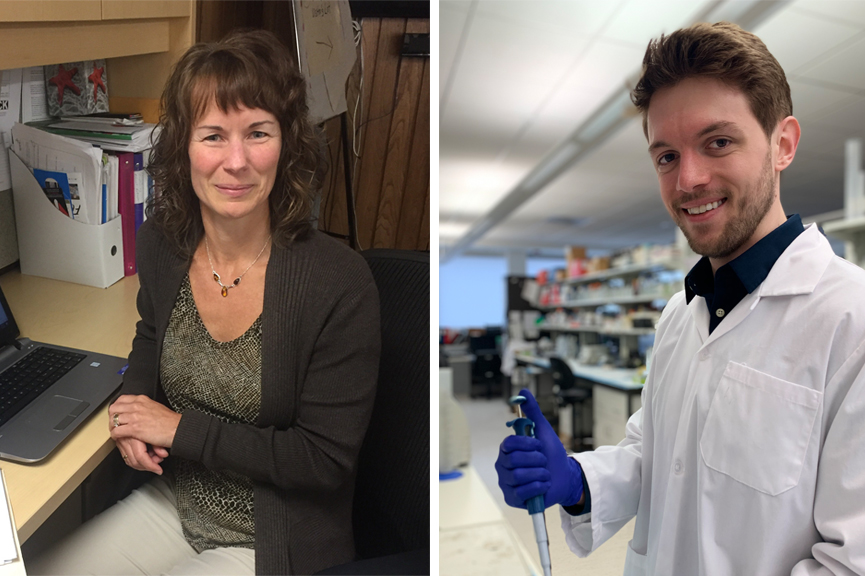
Deanne O'Rourke and Christopher Hart both had to defend their PhD theses using online video conferencing platforms this spring due to social distancing measures.
PhD defenses go virtual amid COVID-19 isolation
Students defending their PhD theses this spring were faced with an unusual scenario due to the COVID-19 pandemic.
Traditionally, PhD candidates appear in a lecture hall in front of a crowd of colleagues, instructors and the public, with invited guests and their advisors giving support. However, this year, students were required to defend their work online from their home over video conferencing platforms like Zoom.
Below, two students from the Rady Faculty of Health Sciences share their work and the experience of defending their academic work of the last number of years virtually.
Deanne O’Rourke
From the College of Nursing’s PhD program, Deanne O’Rourke defended her thesis on May 11, focusing on the use of video feedback as a teaching approach to improve the person-centred communication skills of health-care aides working with residents with dementia in long-term care homes. A clinical nurse specialist with 15 years’ experience in long-term care, she was drawn to the research after witnessing a gap in communication practices over the years.
O’Rourke, who has a bachelor of nursing degree from 1992 and master’s from 2000, both from UM, conducted her research at a long-term care home in Winnipeg with 11 pairings of health-care aides and residents between December 2018 and May 2019. She held education sessions with the health-care aides to discuss person-centred communication approaches and then video-recorded each worker in a routine visit with their resident partner. She then showed each participant their own video in one-on-one sessions to facilitate self-identification of areas the aides wished to improve.
“Video feedback allows people to see and hear themselves from a different perspective, and it brings on a different level of awareness and deeper impact on learning,” she said.
O’Rourke said that while defending her thesis online was different than what she always envisioned, it was a positive experience that went smoothly, thanks to a practice session with her examining committee chair, Dr. Hai Luo, assistant professor in the Faculty of Social Work, and thesis advisor, Dr. Michelle Lobchuk, associate professor in the College of Nursing.
“Someone’s comfort level with technology can really make a difference in an online defense, so being prepared and comfortable with the logistics of the video conferencing platform and the online defense proceedings can help prevent additional stress or anxiety that using an electronic format may create,” she said.
Christopher Hart
A PhD student in the department of physiology and pathophysiology, Max Rady College of Medicine, Christopher Hart defended his thesis on May 22. Hart’s research is centred on stem cell research in spinal cord injuries.
“My project focused on one specific protein called BMP4 and how it was regulating stem cell responses and different pathological responses early after injury,” Hart said. “BMP4 is a key signaling protein that regulates embryogenesis and neurodevelopment, but its role in early injury cascades after spinal cord injuries is not well understood.”
Hart previously earned an undergraduate degree in genetics from UM in 2014 and began working toward his PhD after that. He conducted his research at the Spinal Cord Research Centre at Bannatyne campus using lab rats, working with his advisor, Dr. Soheila Karimi.
“We saw some improvements in therapeutically relevant outcomes and beneficial effects on decreases in the expression of inhibitory matrix proteins that are up-regulated in scar tissue after injury,” he said.
Hart said the hardest part of defending his thesis on a digital platform was the isolation leading up to it.
“If you were in the lab in the week leading up to it you’d see the moral support from your colleagues and supervisor, but on the day it didn’t feel too awkward or nerve-wracking,” he said. “I was basically standing alone in my bedroom talking to my laptop, instead of in a room full of people.”
He also didn’t let the situation get in the way of looking his best.
“I still tried to celebrate the occasion as much as possible by dressing up, getting my suit and shoes on, even if it was just for me,” he said.






